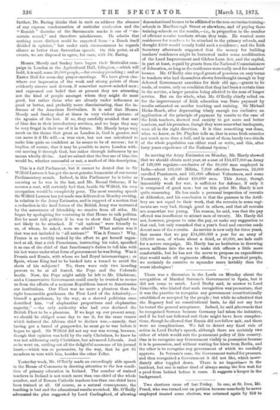This is a dull Parliament, but it cannot be denied
that in Sir Wilfrid Lawson it has got the most genuine humourist of our recent Parliamentary annals. Indeed, in this Parliament he is twice as amusing as he was in the last, and Mr. Bernal Osborne, if he secures a seat, will certainly feel that, beside Sir Wilfrid, his own occupation would be completely gone. The most amusing speech Sir Wilfrid Lawson has yet made was delivered on Monday evening, in relation to the Army Estimates, and in support of a motion that a reduction in the land forces of the British Army was warranted by the assurances of friendship we receive from all sides. He began by apologising for venturing in that House to talk politics. But he must talk politics if he was to show that England was not likely to be attacked. If "all nations" were friendly to us, of whom, he asked, were we afraid ? What nation was it that was not included in "all nations ?" Was it France? Why, France is so terribly tasked by the effort to get herself organ- ised at all, that a rich Frenchman, instructing his valet, specified it as one of the chief of that functionary's duties to tell him with his hot water under what form of government he was living. Was it Prussia and Russia, with whom we had Royal intermarriages ; or Spain, whose King had to be backed into a tunnel to avoid the shots of his subjects? No, there were only two invading powers to be at all feared, the Pope and the Colorado beetle. Now, the Pope might safely be left to Mr. Gladstone, and a Conservative Government could surely be trusted to secure us from the efforts of a noxious Republican insect to Americanise our institutions. Our Fleet was no more a phantom than the right honourable gentleman the First Lord of the Admiralty,— himself a gentleman, by the way, as a shrewd politician once described him, "of elephantine proportions and elephantine sagacity," —the only authority who had ever declared the British Fleet to be a phantom. If we kept up our present army, we should be obliged some day to use it, for the same reason which induced the African chief to declare war,—namely, that having got a barrel of gunpowder, he must go to war before it began to spoil. Sir Wilfrid did not say war was wrong, because, though that opinion was held by the early Christians, he knew he was not addressing early Christians, but advanced Liberals. And so he went on, rattling out all the delightful nonsense of his jocund heart,—which was so persuasive, by the way, that he got 61 members to vote with him, besides the other Teller.


































 Previous page
Previous page